

Industry Insiders Don’t Use Their Products Like We Do. That Should Worry Us. Why Silicon Valley Can’t Fix Itself. Big Tech is sorry.
After decades of rarely apologizing for anything, Silicon Valley suddenly seems to be apologizing for everything. They are sorry about the trolls. They are sorry about the bots. They are sorry about the fake news and the Russians, and the cartoons that are terrifying your kids on YouTube. But they are especially sorry about our brains. Sean Parker, the former president of Facebook – who was played by Justin Timberlake in The Social Network – has publicly lamented the “unintended consequences” of the platform he helped create: “God only knows what it’s doing to our children’s brains.”
Ever since the internet became widely used by the public in the 1990s, users have heard warnings that it is bad for us. In the mid-2000s, as the internet moved on to mobile devices, physical and virtual life began to merge. Still, inside the industry, techno-utopianism prevailed. Internet anxiety isn’t new. Computers also had an image problem. Why Nothing Works Anymore. A Matter Of How You See It Photography Kala / Getty.
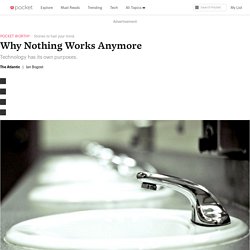
“No… it’s a magic potty,” my daughter used to lament, age 3 or so, before refusing to use a public restroom stall with an automatic-flush toilet. As a small person, she was accustomed to the infrared sensor detecting erratic motion at the top of her head and violently flushing beneath her. How Giving Up TV For A Month Changed My Brain And My Life. Stop Letting Modern Distractions Steal Your Attention. Why beating your phone addiction may come at a cost. At 9.30am on a Wednesday morning, I received a notification telling me I’d already picked up my phone 30 times that day. “11 left until you go over your goal of 41 pickups,” my screen read.
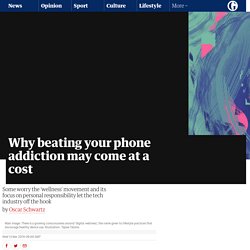
“Put your phone down until 9.52am! Enjoy your time living in the moment.” These updates were sent via Moment, an app that tracks my screen time. Moment was created by Kevin Holesh in 2014 to combat his own device addiction. He was working as an independent app developer, spending hours each day staring at screens. “I wanted a way of seeing how much time I was sinking into my phone,” he told me. Holesh found that he was spending 75 minutes on his phone a day. Holesh figured that if the system worked for him, it would work for others, and later that year he released Moment as a free app. As well as tracking device use, Moment now has a “coach” function, which offers guided programs to help users focus and be more productive, for $7.99 a month. Another popular format is the guided digital detox program.
Will Robots Change Human Relationships? Do Not Disturb: How I Ditched My Phone and Unbroke My Brain. The George Soros speech at the center of the Sheryl Sandberg Facebook controversy. When Kids Google Themselves. Our Digital Lives Don’t Need to Make Us Unhappy, Unhealthy, and Unwise. I Blocked Amazon, Facebook, Google, Microsoft, and Apple. Starting Your Day on the Internet Is Damaging Your Brain - Srinivas Rao - Pocket. I’ve said before the first 3 hours of your day can dictate how your life turns out.
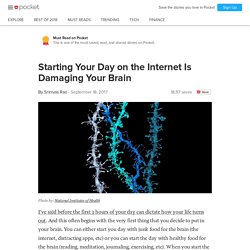
And this often begins with the very first thing that you decide to put in your brain. You can either start you day with junk food for the brain (the internet, distracting apps, etc) or you can start the day with healthy food for the brain (reading, meditation, journaling, exercising, etc). When you start the day with junk food for the brain, you put yourself at a self imposed handicap that inhibits your ability to get into flow and prevents you from doing deep work. When you start the day with health food for your brain, the exact opposite happens. Anytime I start my day with junk food for the brain, the quality of the day goes down. Why Junk Food for the Brain is Toxic. - The Washington Post. ‘Hi, my name is ___, and I’m addicted to tech’ Whether it's a secluded residential treatment center or a 12-step group, the Seattle area has become a hub for treatment of extreme tech use.
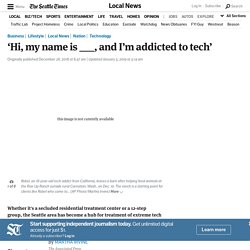
The addiction diagnosis, not officially recognized, crops up among tech workers and others. BELLEVUE, Wash. (AP) — The young men sit in chairs in a circle in a small meeting room in suburban Seattle and introduce themselves before they speak. Where is the boundary between your phone and your mind? Many of the boundary lines in our lives are highly literal, and, for the most part, this is how we’ve been trained to think of boundaries: as demarcations shored up by laws, physical, legal, or otherwise, that indicate exactly where one thing ends and another begins.
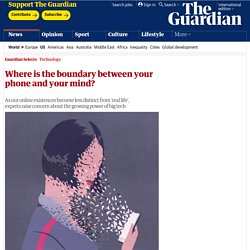
Here is the border of your property; here is the border of your body; here is the border of a city, a state, a nation – and to cross any of these boundaries without permission is to transgress. But one of the most significant boundary lines in our lives is not this way, and one piece of ubiquitous technology is making this line increasingly permeable and uncertain, at a cost that we may only be starting to comprehend. Here’s a thought experiment: where do you end? Not your body, but you, the nebulous identity you think of as your “self”. Does it end at the limits of your physical form? Is our use of digital technologies negatively affecting our brain health? We asked 11 experts.
With so many of us now constantly tethered to digital technology via our smartphones, computers, tablets, and even watches, there is a huge experiment underway that we didn’t exactly sign up for. Companies like Google, Facebook, Twitter, Apple, even Vox (if we’re being completely honest) are competing for our attention, and they’re doing so savvily, knowing the psychological buttons to push to keep us coming back for more. It’s now common for American kids to get a smartphone by age 10. The lost art of concentration: being distracted in a digital world. It is difficult to imagine life before our personal and professional worlds were so dominated and “switched on” via smartphones and the other devices that make us accessible and, crucially, so easily distractible and interruptible every second of the day.
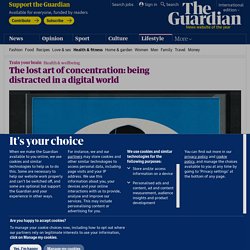
This constant fragmentation of our time and concentration has become the new normal, to which we have adapted with ease, but there is a downside: more and more experts are telling us that these interruptions and distractions have eroded our ability to concentrate. We have known for a long time that repeated interruptions affect concentration. In 2005, research carried out by Dr Glenn Wilson at London’s Institute of Psychiatry found that persistent interruptions and distractions at work had a profound effect.
Those distracted by emails and phone calls saw a 10-point fall in their IQ, twice that found in studies on the impact of smoking marijuana. The impact of interruptions on individual productivity can also be catastrophic. Why a longtime Google exec thinks we need to slow the internet down a bit. Justin Kosslyn leads product management at Jigsaw, the Google (erm, Alphabet) subsidiary working on technological solutions to problems like online censorship and radicalization.
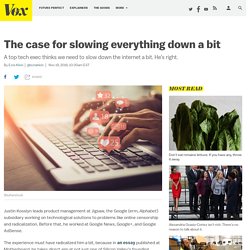
Before that, he worked at Google News, Google+, and Google AdSense. The experience must have radicalized him a bit, because in an essay published at Motherboard, he takes direct aim at not just one of Silicon Valley’s founding assumptions, but one of his parent company’s core business strategies. “The philosophy of the Internet has assumed that friction is always part of the problem,” writes Kosslyn. But look around. The problem now isn’t too much friction; it’s too little. Our digital lives dispense with friction. Digital IDs Are More Dangerous Than You Think. When Tech Knows You Better Than You Know Yourself. For Hackers, Anonymity Was Once Critical. That’s Changing. LAS VEGAS — Ask any hacker who’s been around long enough, and there’s a good chance you’ll hear an archetypal story, tinged with regret, about the first time his or her real identity was publicly disclosed.
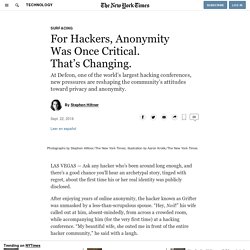
After enjoying years of online anonymity, the hacker known as Grifter was unmasked by a less-than-scrupulous spouse. “Hey, Neil!” His wife called out at him, absent-mindedly, from across a crowded room, while accompanying him (for the very first time) at a hacking conference. “My beautiful wife, she outed me in front of the entire hacker community,” he said with a laugh. Dead Addict’s version of the story involves an employer who pushed him to apply for a patent — for which he was required to provide his full legal name. Instagram is supposed to be friendly. So why is it making people so miserable?
When 24-year-old fashion blogger Scarlett Dixon posted a picture of herself having breakfast, the internet turned nasty.
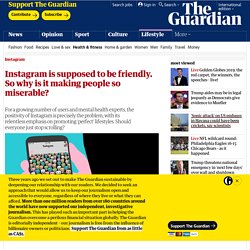
What Most Remote Companies Don’t Tell You About Remote Work. Digital Wellness for Grown Ups. June 19th, 2018 · 38 comments Beyond Digital Wellness Earlier this week, the Washington Post published an article on the digital wellness movement, which attempts to use technology to help cure some of the issues caused by technology. Has dopamine got us hooked on tech? In an unprecedented attack of candour, Sean Parker, the 38-year-old founding president of Facebook, recently admitted that the social network was founded not to unite us, but to distract us. “The thought process was: ‘How do we consume as much of your time and conscious attention as possible?’” He said at an event in Philadelphia in November.
How To Break Your Phone Addiction. I got my first smartphone in the summer of 2012, and ever since, I’ve found myself wishing I had stuck with my flip phone. Silicon Valley Is Over, Says Silicon Valley. Has dopamine got us hooked on tech?